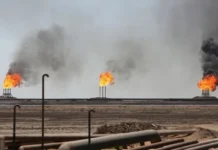Iraq Economic News and Points to Ponder Sunday Afternoon 3-3-24
Tlm724 Administrator Bondlady’s Corner
The International Monetary Fund Praises The Steps Of The Central Bank Of Iraq To Support The Economy
Sunday 03, March 2024 16:00 | Economical Number of readings: 291
Baghdad / NINA / The experts of the International Monetary Fund mission praised the measures taken by the Central Bank of Iraq, which contributed to maintaining the stability of the Iraqi economy and working to raise its capabilities.
The mission said in the final statement on the sidelines of the meetings held in the Jordanian capital, Amman, that “growth in the non-oil sector returned strongly in 2023, with inflation receding and growth in real non-oil GDP is estimated at 6 percent in 2023, after… It will decline in 2022.
Overall inflation declined from the high level it reached of 7.5 percent at the beginning of 2023, to 4 percent by the end of the same year, reflecting the decline in food and energy prices at the international level.
The mission attributed the occurrence of these developments to “the return of trade financing operations to After some interruptions occurred following the implementation of new anti-money laundering and counter-terrorism financing controls on cross-border payments in November 2022, improved compliance with the new system and the initiatives of the Central Bank of Iraq to reduce the transaction processing time led to a recovery in financing. Trade in the second half of 2023.
This ensured that the private sector could obtain foreign currency at official rates for import and travel purposes.
The mission welcomed “the initial steps taken towards establishing the Treasury Single Account (TSA), which is a critical tool for improving cash liquidity management.”
The mission praised “the efforts made by the Central Bank of Iraq aimed at getting rid of surplus liquidity.”
The Central Bank increased the interest rate on monetary policy tools and raised mandatory reserve requirements, and also began issuing treasury bills with a maturity of 14 days last summer.
The Fund called for “supporting the ongoing efforts of the Central Bank by consolidating unused government deposits in an account.” The unified treasury, refraining from pro-cyclical financial policy, reducing reliance on cash financing, and improving public debt management, noting the continuation of efforts aimed at establishing an interbank market with the support of technical assistance provided by the International Monetary Fund.”
The mission welcomes the steps it has taken. The authorities in order to accelerate the pace of digitization of the economy, reduce dependence on cash and enhance financial inclusion.”/End H
https://ninanews.com/Website/News/Details?key=1110911
Staff Concluding Statement Of The 2024 IMF Article IV Mission
March 3, 2024 A Concluding Statement describes the preliminary findings of IMF staff at the end of an official staff visit (or ‘mission’), in most cases to a member country. Missions are undertaken as part of regular (usually annual) consultations under Article IV of the IMF’s Articles of Agreement, in the context of a request to use IMF resources (borrow from the IMF), as part of discussions of staff monitored programs, or as part of other staff monitoring of economic developments.
The authorities have consented to the publication of this statement. The views expressed in this statement are those of the IMF staff and do not necessarily represent the views of the IMF’s Executive Board. Based on the preliminary findings of this mission, staff will prepare a report that, subject to management approval, will be presented to the IMF Executive Board for discussion and decision.
March 3, 2024: An International Monetary Fund (IMF) mission, led by Mr. Jean-Guillaume Poulain, met with the Iraqi authorities in Amman during February 20–29 to conduct the 2024 Article IV consultation. The following statement was issued at the end of the mission:
Economic growth is projected to continue amid fiscal expansion. Meanwhile, medium-term vulnerabilities to oil price volatility have increased significantly. Reducing oil dependence and ensuring fiscal sustainability while protecting critical social and investment spending will require a significant fiscal adjustment, focused on controlling the public wage bill and increasing non-oil tax revenues.
In parallel, higher economic growth will be needed to absorb the rapidly expanding labor force, boost non-oil exports and broaden the tax base.
The authorities should therefore seek to enable private sector development, including through labor market reforms, modernization of the financial sector and restructuring of state-owned banks, pension and electricity sector reforms, and continued efforts to improve governance and reduce corruption.
Economic Outlook and Risks
Growth in the non-oil sector has rebounded strongly in 2023 while inflation receded. Supported by increases in public expenditure and solid agricultural output, real non-oil GDP is estimated to have grown by 6 percent in 2023 after stalling in 2022. Headline inflation declined from a high of 7.5 percent in January 2023 to 4 percent by year-end, reflecting lower international food and energy prices, and the impact of the February 2023 currency revaluation. The current account is expected to have recorded a surplus of 2.6 percent of GDP and international reserves increased to US$ 112 billion.
These positive developments were supported by the normalization of trade finance and the stabilization of FX market. After some initial disruptions following the introduction of new anti-money laundering and combating financing of terrorism (AML/CFT) controls on cross-border payments in November 2022, the improved compliance with the new system and the Central Bank of Iraq (CBI)’s initiatives to cut processing time led to a recovery in trade finance in the second half of 2023. This ensured private sector access to foreign exchange at the official rate for imports and travel purposes.
In the meantime, the fiscal position worsened. Although the expansionary budget was under-executed due to delayed Parliamentary approval, the fiscal balance still declined from a surplus of 10.8 percent of GDP in 2022 to a deficit of 1.3 percent in 2023, due to lower oil revenues and an increase in expenditures by 8 percentage points of GDP, of which salaries and pensions contributed 5 percentage points as the authorities started hiring in line with the budget law.
Overall growth is projected to rebound in 2024 and risks are tilted downwards amid heightened uncertainty. Non-oil growth momentum will continue in 2024. Larger declines in oil prices or extended OPEC+ cuts could weigh on fiscal and external accounts.
If regional tensions escalate, a disruption of shipping routes or damage to the oil infrastructure could result in oil production losses that could outweigh the potential positive impact of higher oil prices. In case of a deterioration in domestic security conditions, this could lead to a decline in business sentiment and suspension of investment projects.
Over the medium term, non-oil growth is projected to stabilize around 2.5 percent given existing hurdles to private sector development. Furthermore, vulnerability to oil price declines has increased as higher expenditures are projected to push the fiscal break-even oil price above $90 in 2024.
Absent new policy measures, the fiscal deficit is expected to reach 7.6 percent in 2024 and widen further thereafter as oil prices are projected to gradually decline over the medium term. As a consequence, public debt would almost double from 44 percent in 2023 to 86 percent by 2029.
Policy Priorities
An ambitious fiscal adjustment would be required to help stabilize debt in the medium term and rebuild fiscal buffers, while protecting critical capital spending. Most of the fiscal adjustment would have to come from reducing current expenditure, especially controlling the wage bill by limiting mandatory hiring and gradually introducing an attrition rule.
The authorities should also seek to increase non-oil revenues by broadening the personal income tax base and making it more progressive, reviewing the customs tariff structure, and considering new taxes on luxury items. In parallel, efforts to make revenue and customs administration more efficient should continue.
Further savings could be obtained through better targeting social support and increasing cost recovery within the electricity sector. These adjustment measures should provide room for the expansion of the targeted social safety net.
The authorities should also strengthen public financial management and limit fiscal risks. The mission welcomes initial steps towards the establishment of a Treasury Single Account (TSA), which is crucial to improve cash management. Further progress is needed and close cooperation between the CBI and Ministry of Finance will be essential.
The next steps are to define TSA design options and complete the bank account census. In future years, overall ceilings on the issuance of guarantees should be specified in the budget law and be enforced. The mission advise against the use of extrabudgetary funds and highlights potential fiscal risks associated with their use.
As a second best, it would be important to ensure the Iraq Fund for Development has appropriate governance arrangements, including governing board independence while ensuring transparency of the Fund’s activities including by publishing its investment plans in the annual budget documentation and restricting its ability to borrow.
The mission encourages the authorities to build on the CBI welcomed efforts to reduce excess liquidity. The CBI appropriately raised the policy interest rate and reserve requirements, introduced a 14-day CBI bill facility last summer, and scaled back its subsidized lending to the real estate sector.
However, monetary policy pass-through has been muted, hampered by large excess liquidity and lack of market incentives in financial intermediaries, especially at state-owned banks.
The CBI’s ongoing efforts should be supported by consolidating idle government deposits in a TSA, refraining from procyclical fiscal policy, reducing the reliance on monetary finance, and improving public debt management.
In parallel, efforts to develop an interbank market with the help of IMF technical assistance should continue. The mission also welcomes the authorities’ steps to speed up the digitalization of the economy, reduce the reliance on cash and enhance financial inclusion.
Wide-ranging structural reforms are needed to foster private sector development and economic diversification. Iraq needs higher and more sustainable non-oil growth to absorb the rapidly growing labor force, increase non-oil exports and government revenue, and reduce the economy’s vulnerability to oil price shocks. Key reform priorities include:
Adopting a comprehensive employment strategy aimed at phasing-out mandatory hiring in the public sector, leveling the playing field between public and private jobs, addressing mismatches between educational curricula and the skills needed in the private sector, and strengthening labor market institutions. The strategy should also aim at reducing informality and addressing legal, social, and cultural impediments to women’s participation in the workforce.
Accelerating financial sector reform to improve access to credit. The authorities are committed to modernizing the banking sector and supporting banks’ ability to secure correspondent banking relationships and have taken steps towards consolidation of small private banks. Efforts to restructure the two largest state-owned banks should intensify, including by expediting certification of past financial statements and implementation of core banking systems, and enhancing corporate governance in line with best practices.
Implementing a comprehensive pension reform. This is urgently needed to reduce the overall projected fiscal costs of the public pension scheme, better align the benefits and rules across the public and private schemes, ensure adequacy of pensions and intergenerational equity, and increase the ratio of workers participating in the private pension scheme.
Combating corruption and improving governance, particularly by strengthening the institutional and legal frameworks needed to ensure the independence of the Integrity Commission and the Board of Supreme Audit, enhancing the publication of assets and conflicts of interests declarations for top level officials, and adopting an updated anticorruption strategy.
Further, public procurement and business regulations should also be enhanced. The authorities should also continue to strengthen the AML/CFT framework and its effectiveness, including in the banking sector, guided by the priority actions identified in the MENAFATF Mutual Evaluation that will be concluded in May 2024.
Removing other hurdles to private sector development by reforming the electricity sector to improve efficiency, cost recovery, and reliable access; simplifying procedures for business registration; and upgrading critical infrastructure.
The IMF staff team stands ready to support the authorities in their reform efforts and would like to thank them for constructive and productive discussions during this mission.
IMF Communications Department MEDIA RELATIONS
To read more current and reliable Iraqi news please visit BondLady’s Corner: https://www.bondladyscorner.com/
Provoking Points to Ponder on Decisions
Continually one faces the horrible matter of making decisions. The solution … is, as far as possible, to avoid conscious rational decisions and choices; simply to do what you find yourself doing; to float in the great current of life with as little friction as possible; to allow things to settle themselves, as indeed they do with the most infallible certainty. – Christopher Morley
When making a decision of minor importance, I have always found it advantageous to consider all the pros and cons. In vital matters, however, such as the choice of a mate or a profession, the decision should come from the unconscious, from somewhere within ourselves. In the important decisions of personal life, we should be governed, I think, by the deep inner needs of our nature. – Sigmund Freud
Pick battles big enough to matter, small enough to win. – Jonathan Kozel
Wisdom consists in being able to distinguish among dangers and make a choice of the least harmful. – Niccolo Machiavelli
I think we should follow a simple rule: if we can take the worst, take the risk. – Dr. Joyce Brothers
http://famousquotesandauthors.com/quotes_by_topic.html
http://famousquotesandauthors.com/topics/decisions_quotes.html






